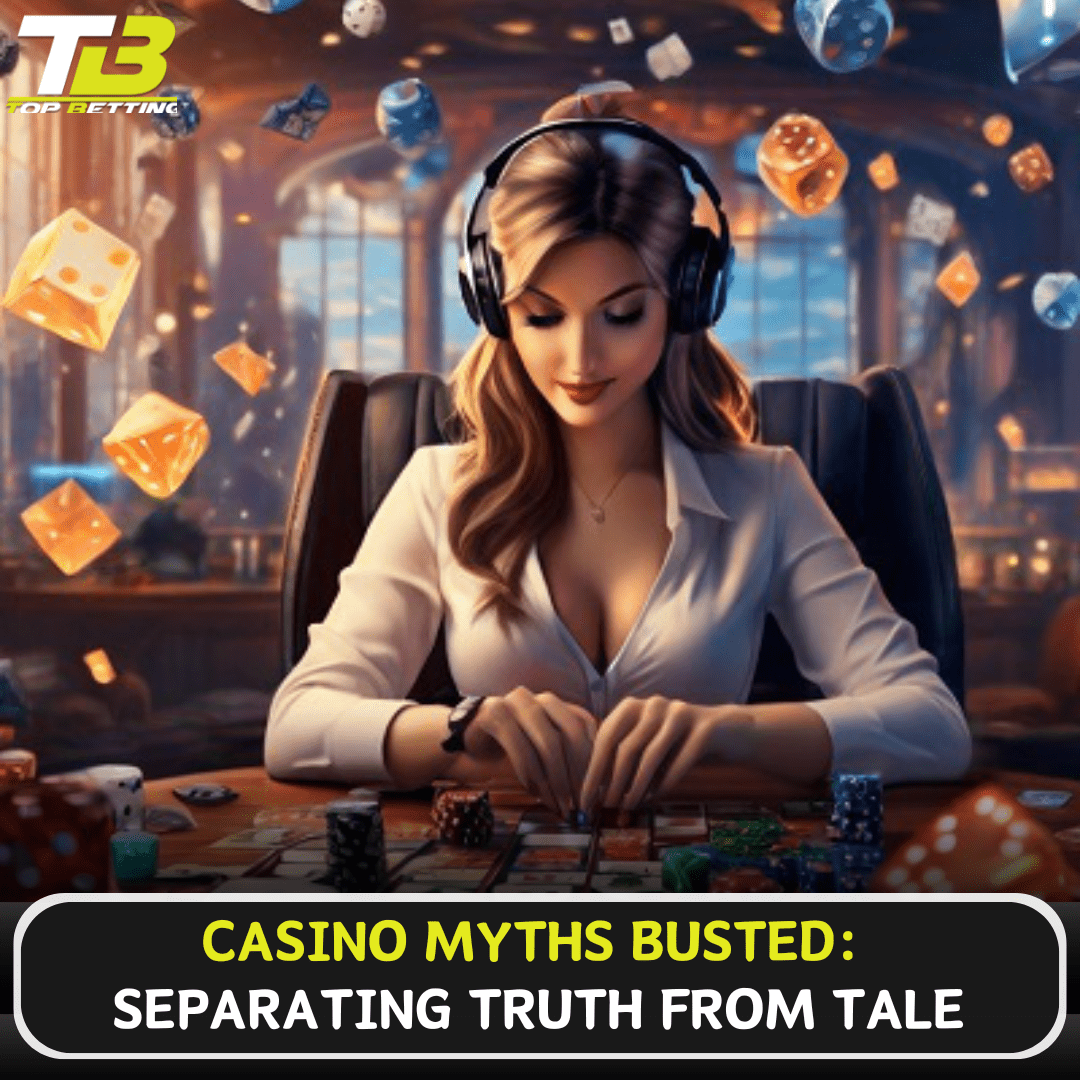
Casino Myths Busted Separating Truth from Tale
Casinos have long been shrouded in mystery, with tales of fortunes made and lost, along with a plethora of myths that have grown around these gambling havens. Whether from movies, stories passed down through generations, or misunderstandings about how gambling works, these myths can shape people’s perceptions and behavior when they step into a casino. While some myths are harmless, others can lead to misconceptions that affect your chances of winning or even your enjoyment of the experience. In this article, we’ll dive deep into some of the most persistent casino myths and reveal the truths behind them.
Myth 1: Casinos Rig Slot Machines to Prevent Payouts
The Myth: A common belief is that casinos can manipulate slot machines to make sure they don’t pay out after a big win, or that they can “tighten” or “loosen” machines at will.
The Truth: Slot machines are governed by random number generators (RNGs), which ensure that each spin is independent of the last and that the outcome is completely random. Casinos cannot alter a machine’s payout rate on a whim. In most jurisdictions, slot machines are heavily regulated, and their payout percentages (also known as return-to-player or RTP) are set by the machine’s programming, which is approved by gaming authorities. While it’s true that some machines are programmed to have lower RTPs than others, the outcome of each spin is entirely random, and previous results have no impact on future ones.
Myth 2: A Slot Machine Is “Due” for a Payout
The Myth: After a slot machine has gone a long time without a win, it’s “due” to hit a jackpot.
The Truth: This myth is based on a misunderstanding of probability. The idea that a machine is “due” for a payout implies that past outcomes influence future ones, but this isn’t the case with slot machines. Each spin is independent of the last, and the chances of winning are the same every time you press the button. Whether the machine just paid out a jackpot or hasn’t paid out in hours, the probability remains unchanged. This is what makes gambling purely a game of chance and not one that can be influenced by previous outcomes.
Myth 3: You Can Find “Hot” or “Cold” Tables in Table Games
The Myth: Players often talk about “hot” tables where players are on winning streaks, and “cold” tables where no one seems to be winning.
The Truth: Like slots, table games such as roulette, blackjack, and craps are also governed by randomness. The outcomes of each hand, roll, or spin are independent of the previous ones. A “hot” table is simply a streak of good luck for the players, and a “cold” table is a streak of bad luck. Neither condition is predictive of future outcomes. In games like blackjack, while strategy can affect your odds slightly, the notion of hot and cold tables is a psychological perception rather than a mathematical reality.
Myth 4: Counting Cards in Blackjack Is Illegal
The Myth: Many believe that counting cards in blackjack is illegal and could land you in jail.
The Truth: Counting cards is not illegal; it’s simply a strategy that some skilled players use to improve their odds against the house. Casinos, however, don’t like card counters because they can reduce the house edge and may ask such players to leave or ban them from playing blackjack. Casinos are private businesses and have the right to refuse service, but they cannot have you arrested for counting cards unless you’re using a device or working with others to cheat, which would indeed be illegal.
Myth 5: The Casino Will Compensate You for Your Losses
The Myth: If you lose a significant amount of money, the casino will give you some of it back in the form of comps or other benefits.
The Truth: While casinos do offer comps like free meals, hotel rooms, or show tickets to players, these are typically based on the amount you wager, not your net losses. The idea is to encourage you to keep playing, not to reimburse you for losing. The more you play, the more you might receive in comps, but they will never be equivalent to the money you’ve lost. Comps are a way for casinos to reward loyalty and keep players in the casino, but they don’t function as a refund.
Myth 6: The Roulette Wheel Has a Memory
The Myth: Some players believe that if a certain number hasn’t come up in a while on the roulette wheel, it’s more likely to come up soon.
The Truth: This is another example of the “gambler’s fallacy,” the mistaken belief that past events affect future ones in games of chance. In roulette, each spin of the wheel is an independent event. The probability of any single number coming up remains the same every time the wheel is spun. Just because red has come up several times in a row doesn’t mean black is “due” to come up next. Each spin is separate from the last, and the odds don’t change.
Myth 7: You’re More Likely to Win Online Than in a Physical Casino
The Myth: Some people believe that online casinos are more generous with their payouts than physical casinos.
The Truth: Both online and physical casinos are regulated and must adhere to strict standards for fairness. The RTP and house edge are determined by the game’s design, not the platform on which it’s played. Online casinos might seem to have better payouts because they often offer bonuses and promotions, but the actual odds of winning are comparable to those in physical casinos. The advantage of online casinos lies in convenience and variety, not in a higher likelihood of winning.
Myth 8: Big Bettors Have Better Odds of Winning
The Myth: The more money you bet, the better your chances of winning.

The Truth: The odds of winning are the same whether you bet big or small. The size of your bet doesn’t influence the game’s outcome. However, betting more does mean that when you win, the payout will be larger. It’s important to understand that while betting larger amounts can lead to bigger wins, it also means you can lose more money faster. Betting big doesn’t increase your odds; it just amplifies the stakes.
Myth 9: You Can Learn to Predict Patterns in Gambling
The Myth: Some players believe they can learn to predict patterns in the outcomes of games like roulette, slots, or craps.
The Truth: Casino games are designed to be random, and no pattern exists that can be reliably predicted. This belief is another form of the gambler’s fallacy, where people see patterns where none exist. In games of pure chance, such as slots and roulette, every outcome is independent of previous ones. Strategies that rely on identifying patterns are based on incorrect assumptions about how randomness works.
Myth 10: Casinos Pump Oxygen to Keep You Awake and Gambling
The Myth: There’s a long-standing rumor that casinos pump extra oxygen into the air to keep players alert and gambling longer.
The Truth: This myth likely persists because casinos do everything else they can to encourage continuous play, such as providing free drinks, eliminating clocks, and using bright lights and colors. However, there’s no evidence to support the idea that oxygen is pumped in to manipulate players. In fact, this would be illegal in most jurisdictions due to health and safety regulations. Casinos rely on other, more subtle tactics to keep players engaged, but manipulating oxygen levels isn’t one of them.
Myth 11: You Can Win Back Your Losses If You Keep Playing
The Myth: The belief that if you just keep playing, you’re bound to win back your losses.
The Truth: This myth is dangerous because it encourages the mindset of chasing losses, which can lead to even greater losses. The concept of “due” wins doesn’t apply in gambling because each bet is an independent event. The odds don’t change in your favor just because you’ve been losing. It’s important to set limits and walk away when you’re ahead or before your losses become too significant. Chasing losses is a quick way to deplete your bankroll and can lead to gambling addiction.
Myth 12: New Slot Machines Pay Out More to Attract Players
The Myth: Some believe that casinos loosen the payout rates on new slot machines to attract players, then tighten them once the machine becomes popular.
The Truth: Slot machine payout rates are set by the machine’s software and are approved by gaming regulators. Casinos do not have the ability to easily change these rates, and doing so would require a significant process, including approval from regulatory bodies. The idea that new machines are “loose” to attract players is a misconception. Payouts are random and determined by the RNG, not by how new or old a machine is.
Myth 13: Drinking Improves Your Chances of Winning
The Myth: Free drinks are often seen as a sign of hospitality, but some believe they actually improve your chances of winning.
The Truth: This is one of the most misleading myths. Alcohol can impair judgment and decision-making, leading to riskier bets and poor choices. Casinos offer free drinks as a way to encourage players to stay longer and gamble more, but drinking can actually decrease your chances of winning by causing you to make irrational bets or continue playing when you should stop. Staying sober is your best bet for making sound decisions while gambling.
Myth 14: The House Always Wins
The Myth: The house always wins, so there’s no point in trying to beat the casino.
The Truth: While it’s true that the house has an edge in all casino games, meaning the odds are slightly in their favor, this doesn’t mean that players can’t win. Many people do win at casinos, sometimes quite significantly. However, the house edge ensures that over time, the casino will make a profit. This is why it’s important to play for fun and within your means, rather than expecting to win big. The key is understanding that while the house edge exists, individual wins and losses are still possible, and luck plays a significant role.
Myth 15: Gambling Systems Guarantee a Win
The Myth: Various gambling systems, such as the Martingale system (doubling your bet after each loss), are often touted as ways to guarantee a win.
The Truth: No gambling system can overcome the house edge or guarantee a win. Systems like the Martingale are based on the assumption that you’ll eventually win back your losses, but this doesn’t account for the fact that you can quickly reach the table’s betting limit or run out of money. Gambling systems can lead to larger losses, as they encourage you to bet more after each loss. The best strategy in gambling is to set limits, play responsibly, and understand that no system can guarantee a profit.
Conclusion

Casinos are places of excitement, risk, and chance, where the thrill of potentially winning big can lead to the spread of myths and misconceptions. Understanding the realities behind these myths is essential for anyone who enjoys gambling, whether as a casual pastime or a more serious pursuit. By debunking these myths, players can approach their casino experience with a clearer understanding of how games work, what to expect, and how to enjoy gambling responsibly. Remember, while it’s possible to win, the most important aspect of gambling is to have fun and know your limits.











